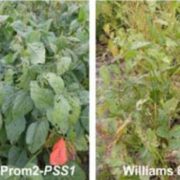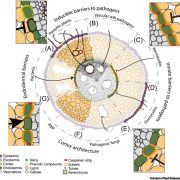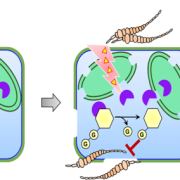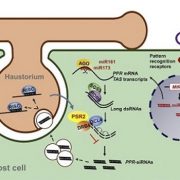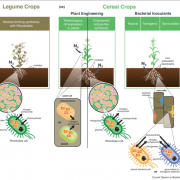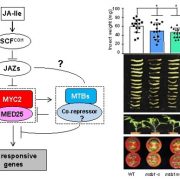PSKR1 balances the plant growth–defence trade-off in the rhizosphere microbiome
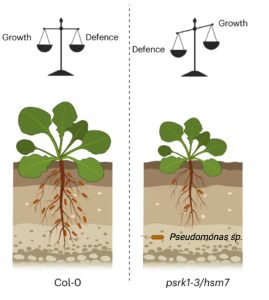 Plants are colonized by numerous beneficial microorganisms in the rhizosphere, including Pseudomonas fluorescens, that provide benefits including nutrient acquisition and pathogen protection. Host plants must tune their immune systems to restrict microbial overgrowth, while avoiding overstimulation of the immune system (autoimmunity). However, the genetic regulator that integrates rhizosphere microbial cues and autoimmune response is largely unknown. Using mutant screening, bulk segregant analyses, overexpression lines, and whole genome sequencing for autoimmune Arabidopsis mutants Song et al. discovered that PHYTOSULFOKINE RECEPTOR 1 (PSKR1) mutants display autoimmunity, characterized by stunted growth and overactive immune responses in response to P.fluorecense. To determine the crosstalk between PSKR1 and rhizosphere microbiome, the researchers conducted 16S microbiome profiling followed by a synthetic community-based (29 members SynCom) experiment, both of which indicated a largely specific effect of PSKR1 towards Pseudomonas and vice-versa. The authors then performed transcriptional profiling (RNA-seq) of Col-0 and psrk1-3 and found that PSKR1 suppressed salicylic acid (SA) mediated defense responses. Additional studies showed that Pseudomonas, and not other bacteria, secrete small molecule(s) that might induce PSRK1 (thereby suppressing SA-mediated defense responses) to promote colonization and balance growth-defense tradeoffs. This study demonstrates the importance of PSRK1 in controlling defense responses and promoting interactions with beneficial Pseudomonas and thus offers strategies to engineer the rhizosphere microbiome to sustainably enhance plant health. (Summary by Arijit Mukherjee @ArijitM61745830) Nature Plants 10.1038/s41477-023-01539-1.
Plants are colonized by numerous beneficial microorganisms in the rhizosphere, including Pseudomonas fluorescens, that provide benefits including nutrient acquisition and pathogen protection. Host plants must tune their immune systems to restrict microbial overgrowth, while avoiding overstimulation of the immune system (autoimmunity). However, the genetic regulator that integrates rhizosphere microbial cues and autoimmune response is largely unknown. Using mutant screening, bulk segregant analyses, overexpression lines, and whole genome sequencing for autoimmune Arabidopsis mutants Song et al. discovered that PHYTOSULFOKINE RECEPTOR 1 (PSKR1) mutants display autoimmunity, characterized by stunted growth and overactive immune responses in response to P.fluorecense. To determine the crosstalk between PSKR1 and rhizosphere microbiome, the researchers conducted 16S microbiome profiling followed by a synthetic community-based (29 members SynCom) experiment, both of which indicated a largely specific effect of PSKR1 towards Pseudomonas and vice-versa. The authors then performed transcriptional profiling (RNA-seq) of Col-0 and psrk1-3 and found that PSKR1 suppressed salicylic acid (SA) mediated defense responses. Additional studies showed that Pseudomonas, and not other bacteria, secrete small molecule(s) that might induce PSRK1 (thereby suppressing SA-mediated defense responses) to promote colonization and balance growth-defense tradeoffs. This study demonstrates the importance of PSRK1 in controlling defense responses and promoting interactions with beneficial Pseudomonas and thus offers strategies to engineer the rhizosphere microbiome to sustainably enhance plant health. (Summary by Arijit Mukherjee @ArijitM61745830) Nature Plants 10.1038/s41477-023-01539-1.


